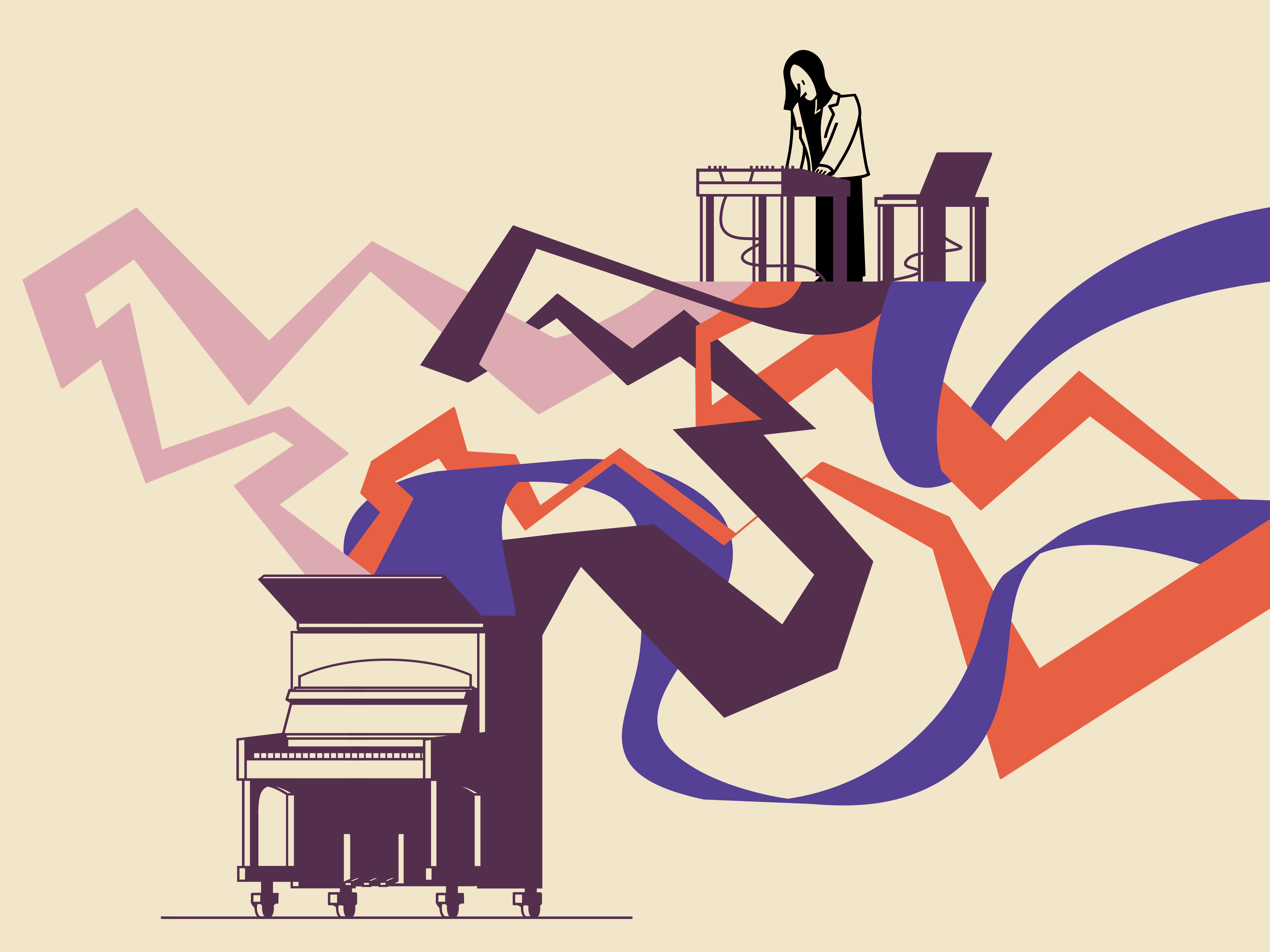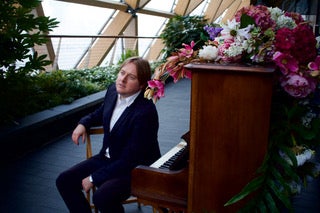Tom Donald on the Vienna Concert by Keith Jarrett
Within weeks of hearing The Vienna Concert, Tom Donald made a decision to change his life, personally and professionally. He told Christine Manby about what this piece of music meant to him


Award-winning composer Tom Donald grew up in rural Australia, where, he says, “There was plenty of time as a kid to just sit for hours and play piano.” He started playing at the age of three, just “sitting there and making things up. I suppose you could call it improvising.”
As Donald’s talent for music became clear, however, those early improvisational instincts were set to one side and he embarked upon a course of formal training that lasted many years. He was studying classical piano and weighing it against the possibility of becoming a composer when he first heard the piece of music that changed the direction of his professional and personal life, The Vienna Concert by Keith Jarrett.
American jazz and classical pianist and composer Keith Jarrett started his award-winning career playing with such greats as Art Blakey and Miles Davis. A master of improvisation, drawing on genres from classical to ethnic folk, Jarrett’s improvised album The Koln Concert, recorded in 1975, is one of the biggest selling piano recordings ever.
Like The Koln Concert, The Vienna Concert that inspired Tom Donald was almost entirely improvised. The live performance was recorded in July 1991 at the Vienna Staatsoper. Donald says of the piece, “I've always regarded The Vienna Concert as a far better recording than The Koln Concert. The Vienna Concert is somewhat a pinnacle of Jarrett’s improvisational work. Even Jarrett writes in the liner notes of The Vienna Concert, that it was his best improvisation to date.”
Jarrett also wrote, “I have courted the fire for a very long time, and many sparks have flown in the past, but the music on this recording speaks, finally, the language of the flame itself.”
It was a language that spoke directly to Tom Donald. “I was looking at being a pianist or a composer as if it was a binary choice,” he says. “Suddenly, I realised I could be both. Jarrett made me realise there are no rules in music. It’s about authenticity. Listening to The Vienna Concert removed a barrier for me. It took me down a completely different path.”
He explains, “My own musical journey of improvisation, and moving away from traditional classical training, led me to the world of film music and writing music for Middle Eastern films, where I really became seduced by non-western intonations and tunings. I don't consider myself an expert in the genre, but I've had the pleasure to work with film directors such as Haider Rashid and Koutaba Al-Janabi on two award-winning films, Leaving Baghdad, which won the Raindance prize back in 2011, and Sta Per Piovere. In both films, I experimented with the use of Middle Eastern scales on the piano, using improvisation to combine western and non-western sound worlds.”
But it wasn’t just Donald’s music that benefited from whole-heartedly embracing improvisation. Within weeks of hearing The Vienna Concert, he’d made a decision to change his life in other ways too. He moved to London. “I had no contacts and did no preparation but it was a starting point.” Once in the United Kingdom, Donald made a living by giving piano lessons. “I was always passionate about education – my parents were both teachers. Then I started teaching myself and saw explicitly the problems in the exam system.”
Thinking about his own musical development to that point, Donald realised that the big breakthroughs he’d had since he first sat down at a piano as a child were as a result of things outside the exam system, which he saw as too rigid. He began to develop The Harmony Method which has improvisation at its core.
Donald believes that musical talent is something everyone is born with and is evangelical about helping that talent thrive
“Music is a language,” Donald says. “When you learn a new language, you learn to speak before you start to read. Think of a young child. They’ve been learning to speak for three or four years before we even think about teaching them to read, so they have that knowledge to build upon when they start matching letters to the words they’ve heard. The problem with the exam system in music, is that we force people to start reading the language of music too soon.”
Donald decided to try to teach music in the way a parent teaches an infant their mother tongue. The first step is to learn how chords work. Donald’s students learn to recognise chords and engage with them like a language. He says, “By teaching harmony first, students get a much richer understanding of music as a whole. They’re able to see inside all music whether it’s pop, jazz or classical. This also opens up students to the similarities between the different genres of music. Harmony and chord progression gives students the skills to really dissect and approach all new pieces of music. No matter what type of music they want to play.”
To spread his method, Donald founded The London School of Contemporary Piano. As well as absolute beginners, the school has attracted a lot of classical pianists and teachers. “They might start out sceptical, but within half an hour they can see how the system works.”
Donald insists that his method isn’t actually so very radical. He suggests that students think about Mozart and the other great composers. “Get into their shoes and look at the first notes they made, not the finished piece. I advise my students that rather than waste time looking up, they look into what the great composers were doing. During the sixteenth and seventeenth centuries, improvisation was common. In the Baroque era, musicians improvised just as in pop.”

For the piano school, lockdown has been challenging “but incredible”. Donald moved the entire school online, taking advantage of cutting-edge technology to provide virtual lessons. Donald demonstrates for me how he can analyse a student’s playing or even take over a student’s keyboard remotely to illustrate a point. The results have been encouraging. Younger students enjoy using the technology. Older students appreciate not having to get on the tube and travel to the physical studio for a lesson. Going online means the school has also been able to host “global jams”, straddling the time zones so that students in the UK can play with students in India and the US.
“Why didn’t we do this earlier?” Donald wonders now.
As well as his piano students, Donald has been making sure that another special group of musicians have the access they need to technology. In 2017, together with human rights activist Becky Dell and Lord Roger Roberts, Donald set up The Citizens of The World Choir, drawing members from refugees and the wider community to “bring peaceful discourse in polarising times”. It has gone from strength to strength. Prior to the pandemic, the choir gigged with Sting at the Globe Theatre.
When lockdown started, it seemed inevitable that the choir would be unable to practice but there were those who relied on choir practice as their only means of social support while they waited for news from the Home Office. The choir’s trustees started a fund to provide tech for those members of the choir who didn’t have it, enabling them to have jam sessions “sing a few songs and catch up”, as Donald puts it. Donald has also been composing new music which he hopes the choir will be able to record as an album.
Meanwhile, Donald is planning a Christmas gala for his piano students. He has been hoping it might be a hybrid concert, with London-based students playing at the school itself and overseas students joining via an online platform. If not, no problem. He’s looking forward to showcasing the talents of students both young, like 10-year-old Joseph, who used the extra time at home during lockdown to compose his own piano sonata, and 86-year-old Ray who decided to learn piano to enable him to play his favourite jazz repertoire.
Ultimately, Donald believes that musical talent is something everyone is born with and is evangelical about helping that talent thrive. As his hero Keith Jarrett said, “If you already have a piece of music ingrained in your body, why would you not play it?”




Join our commenting forum
Join thought-provoking conversations, follow other Independent readers and see their replies
Comments